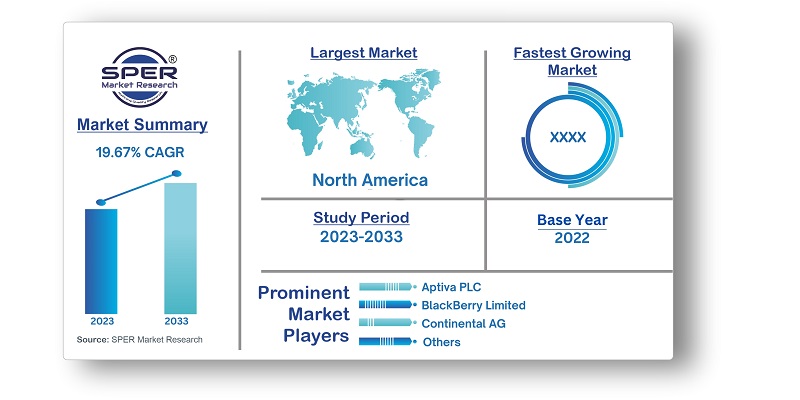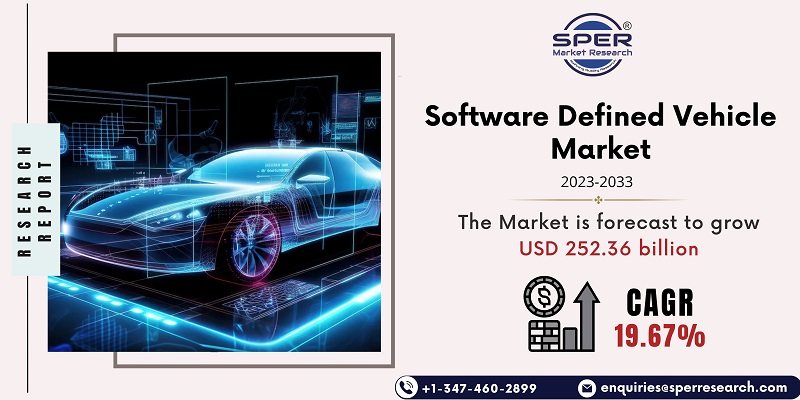
Software Defined Vehicle Market Growth, Size, Trends, Demand, Revenue. Share and Future Outlook
Software Defined Vehicle Market- By Offering, By Vehicle Type, By Vehicle Autonomy- Regional Outlook, Competitive Strategies and Segment Forecast to 2033
| Published: Jan-2024 | Report ID: AMIN2422 | Pages: 1 - 244 | Formats*: |
| Category : Automotive & Transportation | |||
- Sep-2023: In order to offer a range of modular cloud services, including computing, data storage, data analytics, and machine learning, Continental AG partnered with Google Cloud. Through this collaboration, Google's data and artificial intelligence (AI) capabilities will be leveraged to augment Continental's automotive technology expertise, with the goal of creating a cutting-edge range of automotive solutions that prioritize efficiency, safety, and user-centric features, in addition to a suite of management tools.
- Aug-2023: Aptiva PLC partnered with Horizon Robotics, a Chinese manufacturer of motor vehicles. Aptiva PLC hopes to use this relationship to use its unique knowledge to improve the Chinese automobile sector and provide drivers and passengers with a safer, more convenient, and enjoyable travel experience.


| Report Metric | Details |
| Market size available for years | 2019-2033 |
| Base year considered | 2022 |
| Forecast period | 2023-2033 |
| Segments covered | By Offering, By Vehicle Type, By Vehicle Autonomy |
| Regions covered | North America, Asia-Pacific, Latin America, Middle East & Africa and Europe |
| Companies Covered | Aptiva PLC, BlackBerry Limited, Continental AG, Harman International Industries, Marelli Holdings Co., Ltd, Medtronic PLC, NVIDIA Corporation, Robert Bosch GmbH, Tesla, Volkswagen AG. |
- Customization enthusiasts
- Gamers & Experience seekers
- Government & Regulators
- Security & Privacy Conscious Individuals
- Vehicle & Tech Companies
| By Offering: |
|
| By Vehicle Type: |
|
| By Vehicle Autonomy: |
|
- Global Software Defined Vehicle Market Size (FY’2023-FY’2033)
- Overview of Global Software Defined Vehicle Market
- Segmentation of Global Software Defined Vehicle Market By Offering (Hardware, Software, Services)
- Segmentation of Global Software Defined Vehicle Market By Vehicle Type (ICE, BEV, HEV/PHEV)
- Segmentation of Global Software Defined Vehicle Market By Vehicle Autonomy (Level 0, Level 1, Level 2, Level 3, Level 4, Level 5)
- Statistical Snap of Global Software Defined Vehicle Market
- Expansion Analysis of Global Software Defined Vehicle Market
- Problems and Obstacles in Global Software Defined Vehicle Market
- Competitive Landscape in the Global Software Defined Vehicle Market
- Impact of COVID-19 and Demonetization on Global Software Defined Vehicle Market
- Details on Current Investment in Global Software Defined Vehicle Market
- Competitive Analysis of Global Software Defined Vehicle Market
- Prominent Players in the Global Software Defined Vehicle Market
- SWOT Analysis of Global Software Defined Vehicle Market
- Global Software Defined Vehicle Market Outlook and Projections (FY’2023-FY’2033)
- Recommendations from Analyst
1.1. Scope of the report1.2. Market segment analysis
2.1. Research data source2.1.1. Secondary Data2.1.2. Primary Data2.1.3. SPER’s internal database2.1.4. Premium insight from KOL’s2.2. Market size estimation2.2.1. Top-down and Bottom-up approach2.3. Data triangulation
4.1. Driver, Restraint, Opportunity and Challenges analysis4.1.1. Drivers4.1.2. Restraints4.1.3. Opportunities4.1.4. Challenges4.2. COVID-19 Impacts of the Global Software Defined Vehicle Market
5.1. SWOT Analysis5.1.1. Strengths5.1.2. Weaknesses5.1.3. Opportunities5.1.4. Threats5.2. PESTEL Analysis5.2.1. Political Landscape5.2.2. Economic Landscape5.2.3. Social Landscape5.2.4. Technological Landscape5.2.5. Environmental Landscape5.2.6. Legal Landscape5.3. PORTER’s Five Forces5.3.1. Bargaining power of suppliers5.3.2. Bargaining power of buyers5.3.3. Threat of Substitute5.3.4. Threat of new entrant5.3.5. Competitive rivalry5.4. Heat Map Analysis
6.1. Global Software Defined Vehicle Market Manufacturing Base Distribution, Sales Area, Product Type6.2. Mergers & Acquisitions, Partnerships, Product Launch, and Collaboration in Global Software Defined Vehicle Market
7.1. Global Software Defined Vehicle Market Value Share and Forecast, By Offering 2023-20337.2. Hardware7.3. Services7.4. Software
8.1. Global Software Defined Vehicle Market Value Share and Forecast, By Vehicle Type 2023-20338.2. BEV8.3. HEV/PHEV8.4. ICE
9.1. Global Software Defined Vehicle Market Size Value Share and Forecast, By Vehicle Autonomy 2023-20339.2. Level 09.3. Level 19.4. Level 29.5. Level 39.6. Level 49.7. Level 5
10.1. Global Software Defined Vehicle Market Size and Market Share
11.1. Global Software Defined Vehicle Market Size and Market Share, By Offering (2019-2026)11.2. Global Software Defined Vehicle Market Size and Market Share, By Offering (2027-2033)
12.1. Global Software Defined Vehicle Market Size and Market Share, By Vehicle Type (2019-2026)12.2. Global Software Defined Vehicle Market Size and Market Share, By Vehicle Type (2027-2033)
13.1. Global Software Defined Vehicle Market Size and Market Share, By Vehicle Autonomy (2019-2026)13.2. Global Software Defined Vehicle Market Size and Market Share, By Vehicle Autonomy (2027-2033)
14.1. Global Software Defined Vehicle Market Size and Market Share, By Region (2019-2026)14.2. Global Software Defined Vehicle Market Size and Market Share, By Region (2027-2033)14.3. Asia-Pacific14.3.1. Australia14.3.2. China14.3.3. India14.3.4. Japan14.3.5. South Korea14.3.6. Rest of Asia-Pacific14.4. Europe14.4.1. France14.4.2. Germany14.4.3. Italy14.4.4. Spain14.4.5. United Kingdom14.4.6. Rest of Europe14.5. Middle East and Africa14.5.1. Kingdom of Saudi Arabia14.5.2. United Arab Emirates14.5.3. Rest of Middle East & Africa14.6. North America14.6.1. Canada14.6.2. Mexico14.6.3. United States14.7. Latin America14.7.1. Argentina14.7.2. Brazil14.7.3. Rest of Latin America
15.1. Aptiva PLC15.1.1. Company details15.1.2. Financial outlook15.1.3. Product summary15.2. BlackBerry Limited15.1.4. Recent developments15.2.1. Company details15.2.2. Financial outlook15.2.3. Product summary15.3. Continental AG15.2.4. Recent developments15.3.1. Company details15.3.2. Financial outlook15.3.3. Product summary15.4. Harman International Industries15.3.4. Recent developments15.4.1. Company details15.4.2. Financial outlook15.4.3. Product summary15.4.4. Recent developments15.5. Marelli Holdings Co., Ltd15.5.1. Company details15.5.2. Financial outlook15.5.3. Product summary15.5.4. Recent developments15.6. Medtronic PLC15.6.1. Company details15.6.2. Financial outlook15.6.3. Product summary15.6.4. Recent developments15.7. NVIDIA Corporation15.7.1. Company details15.7.2. Financial outlook15.7.3. Product summary15.7.4. Recent developments15.8. Robert Bosch GmbH15.8.1. Company details15.8.2. Financial outlook15.8.3. Product summary15.8.4. Recent developments15.9. Tesla15.9.1. Company details15.9.2. Financial outlook15.9.3. Product summary15.9.4. Recent developments15.10. Volkswagen AG15.10.1. Company details15.10.2. Financial outlook15.10.3. Product summary15.10.4. Recent developments15.11. Others
SPER Market Research’s methodology uses great emphasis on primary research to ensure that the market intelligence insights are up to date, reliable and accurate. Primary interviews are done with players involved in each phase of a supply chain to analyze the market forecasting. The secondary research method is used to help you fully understand how the future markets and the spending patterns look likes.
The report is based on in-depth qualitative and quantitative analysis of the Product Market. The quantitative analysis involves the application of various projection and sampling techniques. The qualitative analysis involves primary interviews, surveys, and vendor briefings. The data gathered as a result of these processes are validated through experts opinion. Our research methodology entails an ideal mixture of primary and secondary initiatives.



Frequently Asked Questions About This Report
PLACE AN ORDER
Year End Discount
Sample Report
Pre-Purchase Inquiry
NEED CUSTOMIZATION?
Request CustomizationCALL OR EMAIL US
100% Secure Payment






Related Reports
Our Global Clients
Our data-driven insights have influenced the strategy of 200+ reputed companies across the globe.




















